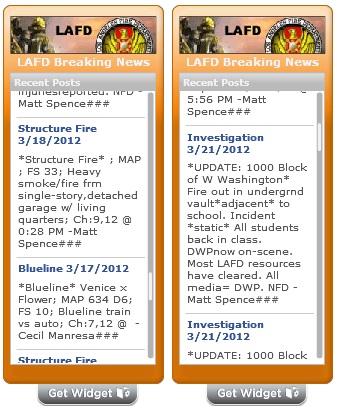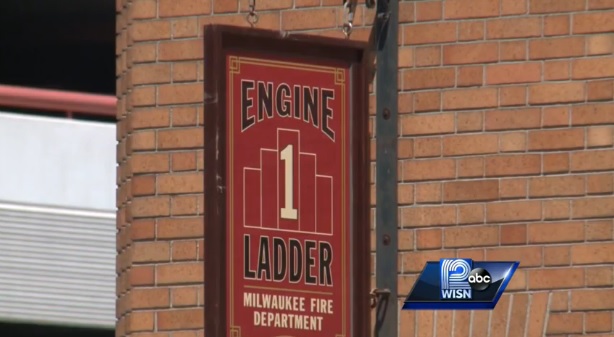Police union takes important stand on allowing public access to body-cams
Since taking office in January, I’ve seen some good moves coming out of the administration of DC Mayor Muriel Bowser in the area of public safety. This administration has shown a better understanding about what is ailing fire and EMS in the Nation’s Capital and seems to be moving in a very positive direction in the effort to clean up a big mess left by those previously in charge. There has also been a general move toward transparency and a better understanding of how to handle bad news (areas where the previous administration failed miserably).
The exception to all of this — and it’s a big one — has been the issue of police body-cams. Mayor Bowser and Chief Cathy Lanier started a pilot program and the city is poised to have half its patrol officers outfitted with cameras later this year as part of the fiscal year 2016 budget.
Click here if video above fails to play
The body-cams themselves aren’t the problem, it’s what the mayor and police chief want to do with the recordings made by those cameras. Bowser and Lanier have been strongly making the case that the press and the public should not have access to body-cam recordings through the Freedom of Information Act. They cite a variety of privacy and logistical concerns.
The great irony, of course, is that a tool that’s supposed to help provide transparency and accountability would be exempt from the law that fosters transparency and accountability in government. DC Council member Kenyan McDuffie, who chairs the committee overseeing the police department, understands this and has led the opposition to the FOIA exemption. But Mayor Bowser recently added a new wrinkle, citing a significant budget issue if McDuffie gets his way (read more here).
The DC City Council is poised to vote on this issue tomorrow (Tuesday) and the usual groups you would expect to fight against the FOIA exemption are doing so. This includes the ACLU, along with organizations representing the press and advocating open government. But a somewhat surprising ally in this battle is the Fraternal Order of Police.
Today, the DC Police Union was part of a joint statement with the District of Columbia Office of Open Government/Board of Ethics and Government Accountability, the Reporters Committee for Freedom of the Press, the Open Government Coalition and the American Civil Liberties Union of the Nation’s Capital strongly opposing Mayor Bowser’s efforts to keep body-cam videos secret.
Considering the environment for police these days it’s a very smart move by the union. While such videos will likely cause problems for some officers, the union’s leadership knows that much of what will be seen is officers doing the right thing for the right reasons. I imagine they also know how important it is to have the trust of the people they serve. Transparency goes a long in encouraging that trust.
Below is the full statement released today. It’s well worth reading:
Mayor Muriel Bowser, in April, proposed outfitting every patrol officer with a body-worn camera to record interactions with the public. She announced the expansion at her State of the District address, claiming “[a]ccountability is embedded, and will be embedded in everything this administration does.” The goals were to improve interactions with civilians, assist investigations of officer misconduct, and promote public trust of the MPD. The cost: $5.1 million in fiscal year 2016 and a blanket exemption denying the public access to the videos.
The proposed Freedom of Information Act exemption prompted overwhelming opposition from transparency and civil liberty advocates. In response, the Council removed the exemption before its first vote on the bill.
In a meeting with the Council Tuesday, the Mayor issued an unprecedented threat. If the Council does not enact the blanket FOIA exemption, the Chief Financial Officer might refuse to certify the 2016 budget as balanced. If that happens, the Council would have to reopen debate on the budget and add $1.5 million to the MPD appropriation or enact the exemption. These are costs that should have been contemplated before the pilot was launched.
The Mayor’s attempt to coerce the Council into denying D.C. residents the ability to obtain BWC video is outrageous and completely contrary to the premise of FOIA — that all persons have full and complete information regarding the affairs of government and those who represent them. This is even more troubling because the Mayor’s claims appear to be based on MPD Chief Cathy L. Lanier’s “sky-is-falling” predictions that the city could receive requests for 4,500 videos each year. Chief Lanier says it will cost $600 an hour for a consultant to review and redact videos, with the remaining allocated to the salaries of additional MPD staff.
In fact, since the BWC pilot program began in October 2014, the MPD has received fewer than 10 FOIA requests for body camera video. At least two of them were very limited, identifying the date, time, location and officer involved. To date, the MPD has denied every request, claiming it lacks the technical capacity to provide redacted videos.
The experiences of other urban police departments with BWC programs demonstrate that Lanier’s claims regarding the labor and financial burdens on the MPD if it must respond to FOIA requests are vastly exaggerated. In Baltimore, for example, the average length of an interaction between an officer and a civilian is 13 minutes, and a working group commissioned by its mayor estimates that responding to a FOIA request for that video would require less than an hour of staff time and cost less than $50. There is no reason to assume that day-to-day policing in the District is much different. But Lanier claims it would take several hours to review and redact the video, and the OCFO’s unsubstantiated estimates appear to peg the cost at hundreds of dollars.
In an effort to both improve transparency and cut down on costs, the Seattle Police Department proactively uploads blurred copies of its BWC recordings on YouTube allowing the public to make targeted requests. Although statistics are not available over the life of its program, in November 2014 the Seattle PD received about 30 FOIA requests for recordings. The District’s population is on par with Seattle, and using that level of interest as a gauge, MPD would receive about 360 requests a year, not 4,500.
The scary and unsupported numbers thrown out by the Mayor fail to take into account several factors that will reduce the labor and expense of FOIA compliance. Not all video taken by body-worn cameras will require extensive and time consuming editing. To reduce the cost of redaction where it is necessary, the Seattle PD has enlisted technology activists to speed and automate the process. In addition, the two major manufacturers of body-worn cameras are developing software to assist in redacting audio and video recordings.
Finally, the Mayor’s argument ignores provisions in the FOIA that allow the MPD to recover the costs of review and redaction by passing them on to requesters in some circumstances.
The Mayor’s apocalyptic claims about the cost of transparency related to the body-worn camera program are diverting attention from the real issues — protecting privacy, the integrity of investigations, and increasing public trust of the MPD. What the MPD should be doing now is implementing the Council’s directive, championed by Judiciary Committee Chairman Kenyan McDuffie, to work with civil society groups to develop strong protocols for collection and retention of BWC videos and metadata, protecting personal privacy, and disclosing requested recordings in compliance with the spirit and the letter of the FOIA.
If the Bowser administration truly wants accountability to be embedded in everything it does, it would acknowledge that existing FOIA exemptions strike the proper balance between privacy and much needed transparency.







